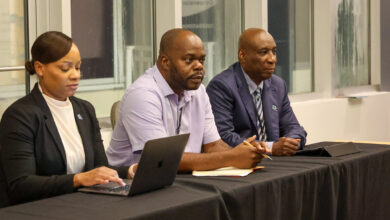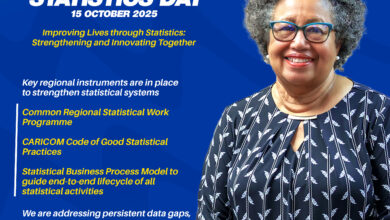Mr. Chairman,
Colleague Ministers of Foreign Affairs of the Community Council,
Secretary General of the Caribbean Community,
Excellencies,
Senior Officials,
Distinguished Guests,
Ladies and Gentlemen,
It is an honour for me to welcome you to Barbados on the occasion of the 21st session of the Community Council.
Barbados is pleased to extend the hand of hospitality, particularly as we gather to further advance the shared imperative of regional integration. I am personally honoured to be among you, many of whom I have known and worked very closely with in another capacity. I look forward to working even more closely with you as the Minister of Foreign Affairs, Foreign Trade and International Business of Barbados. I wish to assure you that Government of Barbados is committed to full and productive engagement as we, together, continue this dynamic regional integration project.
The establishment of the CARICOM Single Market and Economy (CSME) framework represents for the nations of the Caribbean states, the natural progression of a broader, deeper and more complex form of integration. The Declaration of Grande Anse and the work programme for the advancement of the integration movement, outlines a vision for the creation of a single, seamless economic space. Harmonisation of foreign, economic, fiscal and trade policy are key components in the integration strategy, as is the coordination of laws on foreign investment and incentives.
The CSME also represents, a mandatory response to global economic changes, and creates a springboard from which the CARICOM is catapulted into the global economy. Individual nations, small market size, limited resource endowments all converge into a single equation to make a strong case for the establishment of a single market.
Yet, as we move towards the further consolidation of the single market, and ultimately a single economy, there are strong indications that we have yet fully to realise the scope of the opportunity before us, even in the face of inherent challenges. We have before us on the agenda of this meeting, the important matter of functional cooperation. Anaemic intra-regional trade flows have shown that the strength of the community lies not singularly in economic and trade policy, but that there is a strong case to be made for the development of the non-tradeables. We must work assiduously towards the full development of the functional cooperation mandate in the region. We must approach this project, with visionary foresight, and with the passion for regional cooperation that energised the crafters of the early integration movement.
I am particularly enthusiastic about the report to be presented by the Secretary General on the meeting held with Heads of Regional Institutions. As many of you know, my recent past was spent among the NGO and advocacy community in Barbados and across the region. The imperatives of regional integration mandate that Governments, the private sector, regional inter-governmental oganisations and the NGO community, press ahead with strategic partnerships in furtherance of the integration movement. Functional and technical cooperation can be dramatically transformed into dynamic tools of region wide economic, social and human development, if we embrace the modalities of consultation, dialogue, and commitment to the implementation of shared goals.
Another important matter that will occupy us today, is the follow up to the Conference on the Caribbean. The Government of Barbados is particularly anxious to see the potential of this initiative fully realized. As the election machinery in the United States gathers momentum towards the November election, we must prepare for strategic engagement of the new administration. The terms, scope and character of the CARICOM – US relationship must be fashioned in a manner that is mutually beneficial and reflective of contemporary priorities.
The late Errol Walton Barrow, National Hero of Barbados once said, ‘foreign and domestic policy are the obtuse and obverse sides of the same coin.’ The recently initialed Economic Partnership Agreement between CARIFORUM and the European Community is perhaps the most current illustration of this statement.
The CARIFORUM – EC Agreement goes well beyond the traditional scope of trade agreements, and incorporates elements that have been, up until this point, the sole purview of national and regional jurisdiction. It goes beyond the existing arrangements within the Community and will shape every subsequent agreement CARICOM negotiates with extra-regional partners. It will have a significant impact on all our national economies, our tax structures and on competitiveness. When Errol Barrow made this statement, there could have been no appreciation for the pervasiveness of modern globalization and the consequential interdependence of foreign and domestic policy.
The region has had to adapt to a fast paced information and communications technology driven international economy, while simultaneously building competitiveness and developing mechanisms to attract foreign investment. We have had to implement measures to increase domestic and cross border capitalisation, improve systems of governance and promote sustainable development. We continue to stand at the cross roads of decision even as the new international economy takes shape and identity.
History is being written with each meeting of this kind that engages some of the most experienced and brightest policy making minds our region has to offer. We must appreciate that the future prosperity of our people depends on us. In every practical sense, there is and can be no divide among our foreign, regional and domestic policy. Unless we give force of law and domestic implementation to the decisions taken at a community level, the realistic expectation that the CSME will be the engine of economic growth and development will be unrealized. Barbados remains committed to completing all obligations under the Revised Treaty of Chaguaramas and giving effect to both the spirit and intent of the CSME.
The Community Council as the second highest organ in the community, bears the weighty responsibility for the development of Community Strategic Planning and coordination in areas of economic integration, functional cooperation and external relations. The matters which we will consider here today, are of critical importance and form an important pillar in the CARICOM institutional architecture.
Colleagues, I wish to leave you with one last thought. I am fully persuaded that many of those who have gone before us have provided us with a platform upon which we can launch our future. Victor Hugo writing in 1867 said this:
“In the 20th century there will be an extraordinary nation. This nation will be large, which will not prevent its being free. It will be illustrious, rich, thoughtful, peaceful, friendly towards the rest of humanity……it will be called Europe.”
This statement projected a future for Europe, as a single nation, long before the 1994 Maastrict Treaty. I look forward to future generations having an opportunity to reflect on the region, and on us, as visionaries, who added important layers to the institutional scaffolding that will support a prosperous and ‘extraordinary’ regional union – a unified Caribbean Community based on the principles of strong economic growth, innovation, balanced trade, social and human growth and full, holistic development. We have made admirable strides, but there is still a long and difficult road ahead. We must be prepared to stay the course.
Thank you.





